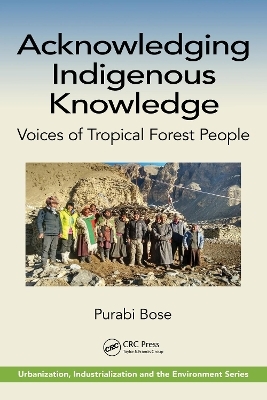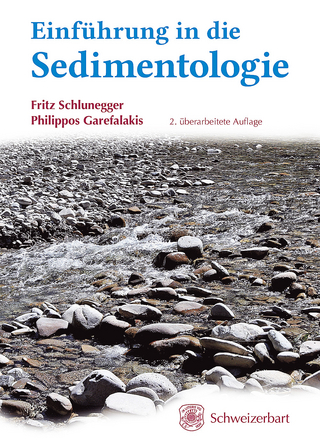
Acknowledging Indigenous Knowledge
CRC Press (Verlag)
978-0-367-71025-5 (ISBN)
This book explores how the landscapes in indigenous territories are rapidly changing due to increased global industrial demand. This deforestation and urbanization have isolated the indigenous people from practicing ‘traditional ways of life.’ Portrayed in this book is the indigenous people’s perspective of their indigenous knowledge (IK) about the environment and why losing IK is a threat to humans, wildlife, and nature. Insight is shared into why acknowledging IK as a science can help solve climate change, food and nutrition insecurity, and increasing new types of pandemics through evidence‑based stories from indigenous people.
Features:
• Bridges the fractured space between science and nature.
• Documents the perspectives of indigenous peoples about their ancestral knowledge.
• Provides ethnographic qualitative comparative case studies of forest‑dwelling indigenous peoples over a 19‑year period.
• Covers largely remote indigenous territories of ten tropical countries in the Global South.
• Provides evidence‑based stories examining indigenous knowledge’s role in the tropics in preserving diverse landscapes and providing nature‑based solutions.
Purabi Bose, a citizen of India with Santhal tribe/Adivasi ancestry, is a social anthropologist and environmental scientist with a research focus on forest tenure and land rights of indigenous peoples, climate adaptation, and food security in Asia, East Africa, and Latin America. Currently, she is an Associate Professor (Docent) and Senior Lecturer of Forest Policy at the Swedish University of Agricultural Sciences (SLU), Sweden. Her professional affiliations have spanned NGOs, philanthropic, international research, academic, and think tanks with a focus on rural and tribal development, natural resource governance, and social inclusion. She is passionate about simplifying science for better communications and helps in capacity building, teaching, partnership, policy analysis, research, and publications. Purabi holds a Ph.D. from Wageningen University and has held numerous fellowships, including those at the University of California, Berkeley, the Swedish University of Agricultural Sciences, the University of Copenhagen, and the Smithsonian Institute. She presented her research work at over 100 international conferences. She has published her research in peer‑reviewed journals and in popular science media. As a filmmaker, she is a producer and director of independent films on forests, mountains, land, and the way of living of indigenous peoples. This is done under her self‑funded initiative, Landing Together. Further details about films and protagonists at www.landingtogether.weebly.com Her pro‑bono responsibilities with the International Union of Forest Research Organization (IUFRO) include as a Voting Board Member, Coordinator of Division 6 on Social Aspects of Forests and Forestry, and a member of the Congress Scientific Committee for IUFRO Congress Stockholm, 2024. Earlier she was a Council Member of the International Association of Study of Commons (IASC). She is a member of IUCN’s two commissions: CEESP and CEC. In 2023, Purabi was appointed as an International Fellow by the Royal Swedish Academy of Agriculture and Forestry (KSLA). Growing up in a below‑poverty family on the outskirts of Mumbai helps Purabi to be humble. She connects with people in 10+ languages and has been an expatriate who lived in 11 countries on four continents for professional work. Often you will find her mountaineering, cooking, playing drums, doing hand‑embroidery, calligraphy, and cheering as a football fan. She works hard so that Felix, a tabby tom cat that adopted her, can have a better life, and they travel the world together.
Foreword - Prof.dr. Bernd van der Meulen
Chapter 1
Acknowledging Indigenous Knowledge: Introduction
Chapter 2
‘Nature-Based Knowledge’ Aligning Science and Wisdom
Chapter 3
Extractive Industries Mining Way in Indigenous and Local Communities
Chapter 4
Food as Commodity – ‘Super’ Food Insecurity of Indigenous Peoples: Analysis from Asia, Africa and Latin America
Chapter 5
Pastoralists, Nomadic Movements, and Identity in Tropical Grasslands
Chapter 6
Factory Schools: Erasing Children’s Indigenous Knowledge and Languages
Chapter 7
Indigenous Peoples and Wildlife Coexistence in Tropical Mountains: Socio-Cultural Impact
Chapter 8
Communicating the Art of Bridging Indigenous Knowledge with Science and Policy
| Erscheinungsdatum | 10.07.2024 |
|---|---|
| Reihe/Serie | Urbanization, Industrialization, and the Environment |
| Zusatzinfo | 2 Tables, black and white; 12 Line drawings, color; 12 Illustrations, color |
| Verlagsort | London |
| Sprache | englisch |
| Maße | 156 x 234 mm |
| Gewicht | 453 g |
| Themenwelt | Naturwissenschaften ► Geowissenschaften ► Geologie |
| Weitere Fachgebiete ► Land- / Forstwirtschaft / Fischerei | |
| ISBN-10 | 0-367-71025-0 / 0367710250 |
| ISBN-13 | 978-0-367-71025-5 / 9780367710255 |
| Zustand | Neuware |
| Haben Sie eine Frage zum Produkt? |
aus dem Bereich


